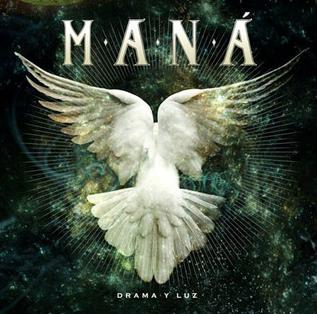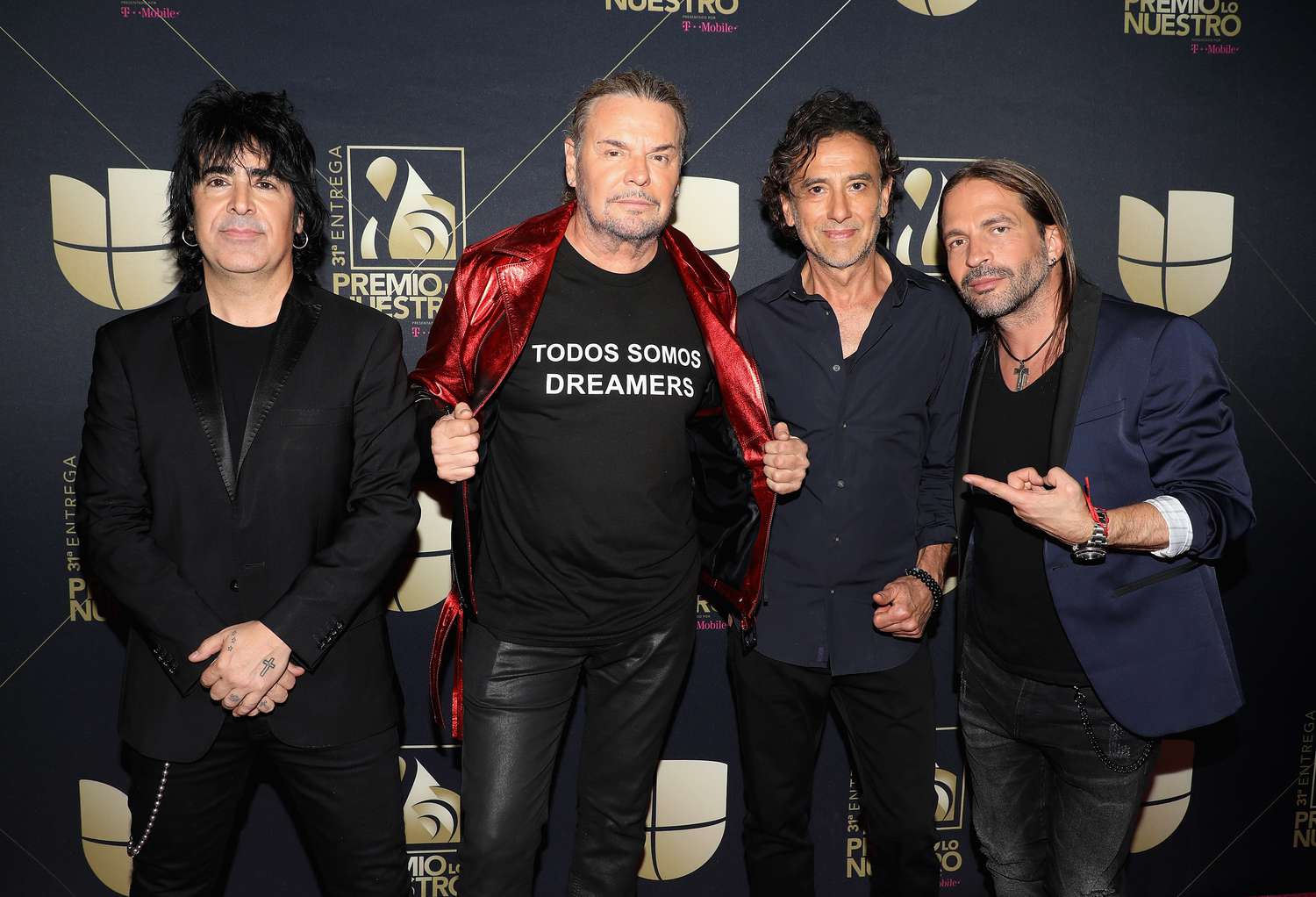From humble beginnings as Sombrero Verde in 1981, Maná has cemented its place as not just one of the best-selling Latin Mexican music artists, but as the most successful Latin American band of all time. With over 45 million records sold worldwide, the band has had a substantial Impact on the muscial landscape on both Latin and American Charts. Think Aerosmith plus Creed with Latin flavor.
The story of Maná is one of evolution and unwavering dedication. After six years honing their craft under the name Sombrero Verde, the group took the leap and rebranded themselves as Maná in 1986, releasing their self-titled debut album in 1987. While the album garnered attention, it was the groundbreaking release of ¿Dónde Jugarán Los Niños? in 1992 that truly catapulted them to superstardom. This album, selling over 10 million copies globally, including a staggering 700,000+ in the US, remains the best-selling Spanish-language rock album ever.
Maná’s journey hasn’t been without its changes. Through various membership adjustments, the core spirit of the band remained intact, leading to continued innovation and artistic exploration. Cuando los Ángeles Lloran (1995) marked a significant shift in their sound, signaling a willingness to experiment and redefine their musical boundaries.
This adventurous spirit continued with subsequent albums, including the critically acclaimed Sueños Líquidos (1997), Revolución de Amor (2002), and Amar es Combatir (2006). Each album showcased Maná’s ability to blend diverse influences and maintain their connection with fans worldwide. Continuing their consistent output, they released Drama y Luz in April 2011, followed more recently by Cama Incendiada in early 2015, proving their continued relevance in a constantly evolving music industry.
The band’s enduring appeal lies in their ability to seamlessly weave together a diverse tapestry of musical influences. Maná’s sound is a vibrant blend of pop rock, progressive rock, Latin pop, calypso, reggae, and even ska, creating a unique and infectious energy that transcends geographical boundaries.
Maná’s success is not just defined by record sales. Their mantlepiece brims with accolades, including four Grammy Awards, eight Latin Grammy Awards, five MTV Video Music Awards Latin America, six Premios Juventud awards, 19 Billboard Latin Music Awards, and 15 Premios Lo Nuestro awards. These awards are a testament to their artistry and the profound connection they have forged with audiences across the globe.
1986-1989- The Sombreo Verde Years
Featuring the core talents of José Fernando “Fher” Olvera, Ulises Calleros, and Juan Calleros. Sombrero Verde dissolved in 1983, leaving the trio with a burning desire to create something new.
In 1986, fueled by the ambition to forge a distinct musical path, Fher (vocals), Ulises (guitar), and Juan (bass guitar) officially formed Maná. To complete their lineup, they placed an advertisement in a local Guadalajara newspaper, seeking a drummer to solidify their sound. A 15-year-old American, Alex González, answered the call. Impressed by his talent and energy, they welcomed him into the fold, completing the quartet that would soon conquer the Latin music scene.
Maná’s self-titled debut album arrived on May 12, 1987, released on A&M Records. While the album showcased the band’s potential, it was the move to PolyGram and subsequently to Warner Music shortly before their second album, Falta Amor, that proved pivotal. The band was unhappy with direction PolyGram was taking the band. This switch in labels set the stage for their breakthrough.
Falta Amor was released, and while initial reception was modest, the album’s potential was undeniable. It took two years, but the album finally spawned its first hit single, the now-iconic “Rayando el Sol.” This song ignited a spark, propelling Maná into the spotlight.
Riding the wave of “Rayando el Sol’s” success, Maná embarked on a relentless touring schedule. They hit the road, performing over 250 shows throughout Latin America, building a devoted fanbase in Mexico, Peru, Ecuador, and Colombia. These early performances, honed through dedication and a fervent love for their music, laid the foundation for the band’s future superstardom.
The period between 1986 and 1989 marks the formative years of Maná. It was a time of experimentation, collaboration, and relentless pursuit of their artistic vision. From the ashes of Sombrero Verde, a phoenix rose, fueled by passion and a shared dream. These early releases and the grueling touring schedule solidified the band’s chemistry and laid the groundwork for the global success that would soon follow, cementing their place as true titans of Latin rock.
1990-96- Commercial Years
The group experienced significant changes and achieved monumental success in the early to mid-1990s, solidifying their place as one of the most influential Spanish rock bands of all time.
In 1991, the band welcomed two new members, adding fresh perspectives and sonic textures. Iván González joined on keyboards, and César “Vampiro” López took up the guitar. Simultaneously, Ulises Calleros transitioned from performing with the group to taking on a managerial role, further shaping the band’s direction from behind the scenes.
This lineup proved to be a winning combination, culminating in the release of ¿Dónde Jugarán Los Niños? on October 27, 1992. This album would catapult Maná into the stratosphere of international recognition. Featuring a collection of now-classic hits such as “Oye Mi Amor,” “De Pies A Cabeza,” and “Vivir Sin Aire,” the album resonated deeply with audiences across the Spanish-speaking world. Its impact was undeniable, as it soared to become the best-selling Spanish-language rock album of all time, selling over three million copies globally. The success of ¿Dónde Jugarán Los Niños? propelled Maná onto an international stage, embarking on an extensive tour that spanned 268 concerts in 17 countries, further cementing their global appeal.
However, this period of unprecedented success was followed by internal challenges. In 1994, López and González departed from the group due to musical and personal differences. This departure presented Fher Olvera and Alex González with a significant opportunity to redefine the band’s sound. They embarked on a meticulous search, scouring Mexico, Spain, and Argentina, seeking a new guitarist who could contribute to the evolving musical vision of Maná.
During this transitional phase, Maná released the live album, Maná en Vivo, offering fans a captivating glimpse into their electrifying stage presence. Ultimately, the search led them to Mexican guitarist Sergio Vallín, who replaced both Calleros and López, becoming a key ingredient in Maná’s future sound.
Before fully solidifying their new lineup, Maná paid tribute to their rock influences. In 1995, they recorded a Spanish version of Led Zeppelin’s “Fool in the Rain,” titled “Tonto En La Lluvia,” for the tribute album Encomium. This showcased their respect for the giants of rock and roll while simultaneously demonstrating their ability to adapt and interpret classics within their own unique musical framework. Their collaboration ” Mi Corazon Espinado” with music genius Carlos Santana on his Supernatural album was an instant classic.
Through both triumphs and tribulations, Maná navigated the complexities of the music industry with resilience and a commitment to artistic growth. The departure of key members, while challenging, ultimately paved the way for a renewed creative energy that would continue to define Maná in the years to come.
1997 to the present: A legacy of music, activism and Global Impact
The late 1990s marked a period of significant breakthrough for the band. In 1997, Maná released “Sueños Líquidos,” a collection of songs exploring the complexities of love. Tracks like “Clavado en un bar” and “En el muelle de San Blas,” recorded in Puerto Vallarta and distributed simultaneously in 36 countries, became instant classics. This album earned them a Grammy Award for Best Latin Rock/Alternative Album, solidifying their international recognition. The momentum continued with their “MTV Unplugged” performance in Miami, which was later mixed in Hollywood’s Conway Recording Studios and released as “Maná MTV Unplugged” in 1999.
Experimentation fueled their creativity in the early 2000s. “Revolución de Amor” (2002) saw the band incorporating elements of 1960s and 70s rock and roll, resulting in another Grammy win. They also collaborated with Italian musician Zucchero, recording a version of “Eres mi Religión” and contributing to Zucchero’s “Baila Morena.” In 2003, they shared the stage with music legends like Queen, Deep Purple, and Bono at the Pavarotti & Friends concert. Their most recent studio album, “Cama Incendiada,” was released in 2015.
Maná’s contributions to music have been widely celebrated. In 2016, they received a star on the Hollywood Walk of Fame. In 2018, they were honored with the Billboard Latin Music Lifetime Achievement Award and named the Latin Recording Academy Person of the Year. The band embarked on their “Rayando el sol tour” in 2019, releasing a new version of their hit song “Rayando el sol” featuring Pablo Alborán. In 2021, they were presented with the icon award at the Billboard Latin Music Awards, where they performed a remake of “El Reloj Cucú” with young singer Mabel. In 2025, Maná received their first nomination for induction into the Rock and Roll Hall of Fame, marking them as the first Spanish-language rock group to be considered for this honor.
Beyond their musical achievements, Maná has consistently used their platform to advocate for environmental and social causes. In 1995, they established the Selva Negra Foundation (“Black Jungle Foundation”), which supports projects aimed at protecting the environment. Their efforts include initiatives to save endangered sea turtles, raising and releasing thousands of turtle eggs on Mexico’s Pacific coast. In 2008, Maná and the Selva Negra Foundation were recognized as “Champions of Health” by the Pan American Health Organization for their contributions to environmental and public health.

Maná’s commitment to social and political issues is woven into their music and actions. Their songs often carry messages of environmentalism, human rights, and social justice. They have openly supported political causes, including Puerto Rican independence and Barack Obama’s reelection bid. However, their stance can also lead to controversy. In September 2024, the band removed the song “De Pies a Cabeza,” recorded with Nicky Jam in 2016, from all digital platforms after Jam endorsed Donald Trump for president.
From their early days as Sombrero Verde to their current status as global rock icons, Maná’s journey is a remarkable story of musical evolution, unwavering dedication, and an undeniable connection with fans worldwide. They have successfully crossed cultural barriers and carved a unique space for themselves in the international music scene, solidifying their legacy as the most successful Latin American band of all time.



